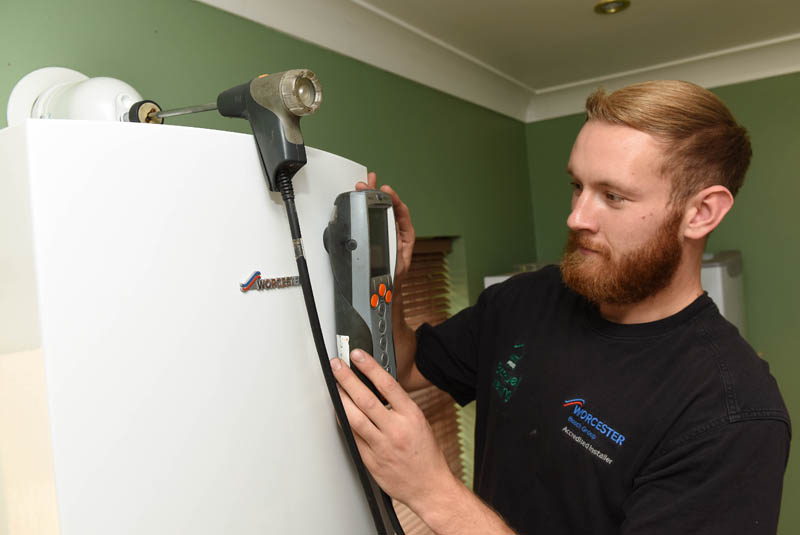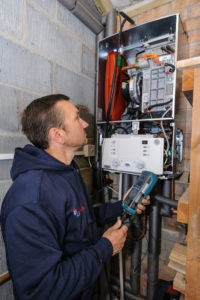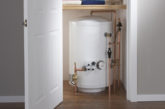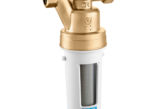
With much debate surrounding the subject of annual servicing, Martyn Bridges, Director of Technical Communication and Product Management at Worcester, Bosch Group, discusses the benefits of mandatory boiler servicing and the common procedures that should play their part.
As plumbing and heating professionals will know all too well, efforts to encourage homeowners of the benefits of an annual boiler service frequently fall short There is still an “it’s working so leave it alone” mindset adopted by many householders, combined with the fact it remains optional rather than a mandatory requirement.
We are entering a period of change where the quality and consistency of the gas that comes from the mains supply is slowly transforming. There are already areas around the country where biogas is being injected directly into the mains; there are discussions about hydrogen either being added to or, ultimately, replacing the gas supply; as well as gas imports increasing.
The changes to fuel will have obvious implications for the country’s gas boilers, meaning that the consistent combustion performance that takes place may not be as consistent as we are currently experiencing. The effect of these changes to the gas on the performance of a boiler is enough to suggest the need for regular checking and servicing of a heating system.
So, as we enter into a period where annual boiler servicing could conceivably become mandatory, it would now seem the ideal opportunity for installers to remind their customers of the importance of a check, which regularly looks at the common issues that might hinder the efficiency of their heating system. Whilst some of these will be specific to the individual boiler, there are a number of common requirements for engineers to consider.
Common considerations
Check the water
The quality of the water within the heating system is potentially one of the biggest contributors to the efficiency of a boiler. Research shows that a heating system heavily contaminated with magnetites, sludge and various other corrosion impurities could result in as much as 6% reduction in efficiency when compared to water in a clean system.
 It is a common occurrence that plumbing and heating engineers will be called out to a home with a heating system that is 40 or 50 years old and has already had three or four boilers connected to it during this time. If this is the case, the first priority should always be to ensure the heating system water is clean and has a corrosion inhibitor added to it – this should be an annual check to make sure the system is not corroding and still has enough inhibitor within.
It is a common occurrence that plumbing and heating engineers will be called out to a home with a heating system that is 40 or 50 years old and has already had three or four boilers connected to it during this time. If this is the case, the first priority should always be to ensure the heating system water is clean and has a corrosion inhibitor added to it – this should be an annual check to make sure the system is not corroding and still has enough inhibitor within.
Check the appliance
Following this, the engineer should look at the working of the boiler itself and make sure that the combustion efficiency of an appliance reads as per the manufacturer’s instructions – ideally at least once a year. To ensure efficiency, the CO/CO2 ratio of the flue gases must be measured and the appliance adjusted if any excess or insufficient air is found going into the boiler. After the combustion settings have been verified, installers must then examine the heat exchanger for any debris or contamination that could affect the transfer of it, replacing it if necessary.
Check the controls
Once it has been established that the boiler and the water within it are in working order, continued efficiency is then determined by things such as controls and the balancing of the heating system.
With this in mind, plumbing and heating professionals should be making sure their customers’ heating systems are fitted with the most effective controls. Any control system should evidently time the on/ off periods of the system, with a room thermostat to turn the boiler and pump off when the desired room temperature has been achieved.
A further level of controls should be considered with condensing boilers, such as weather and/or load compensation, to keep the boiler firing at the lowest temperature to be able to provide the desired room temperature.
Check the parts
Alongside the above servicing needs, there is an argument that favours proactive replacement. Generally, the biggest cost involved in boiler servicing is actually incurred travelling to the property, so it makes perfect sense for an engineer to change any older wearable parts whilst they are already there. This could involve anything from a seal to an electrode, and will be determined by referring to the manufacturer’s service and maintenance instructions.
‘Anniversary part changes’ are particularly common with oil boilers, where an engineer will likely change the nozzle and the flexible oil pipe as a matter of course, which not only prevents call-outs, it also provides customers with the comfort levels they expect.
Servicing security
Despite annual boiler servicing not currently a legal requirement, there is little more important when it comes to ensuring the continuity of use, safety and efficiency of a heating system. Installers, industry bodies and manufacturers must continue to strive to challenge homeowners’ attitudes and reap the rewards of a great heating efficiency – both at a local level in the form of lower energy bills, and at a wider level as strive to reduce our impact on the environment.
For more information on Worcester, visit: www.worcester-bosch.co.uk













